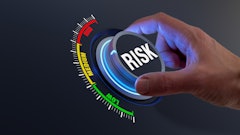Horizon Lines chief highlights three information layers necessary to secure U.S. against terrorism through container shipping
Washington, DC — May 1, 2006 — The maritime industry must work with the U.S. government on technological solutions to ensure supply chains against terrorism through container shipping, according to the head of America's largest domestic ocean carrier.
Speaking before a harbor safety conference here last week, Charles G. Raymond, CEO and president of Horizon Lines, said that the industry needs three information layers to secure the United States from terrorism imported in container shipping.
"The critical point for control in the supply chain is at the point of embarkation, before the journey across the sea even begins," said Raymond. "And that is solely dependent on the quality of the data and security checks. You wouldn't fly an airline whose security check on baggage and passengers [occurred] on arrival; you should be concerned about cargo before it ever leaves the dock overseas."
The three information layers, Raymond said, include:
Using as an example Horizon Services Group (HSG), the technology-focused subsidiary of Horizon Lines, Raymond noted that the company has developed "high octane data management and container tracking systems." These systems provide, among other capabilities, global container management, a central data repository, operating system management, tracking capability alerts and reporting tools.
"In addition, HSG has implemented container tracking pilots that track physical containers across North America and Puerto Rico inland locations, something that remains a huge black hole in the industry today," Raymond said.
"For the sake of speed and cost it makes a great deal more sense for the Department of Homeland Security to look to the current technicians of container transportation for the data and data handling systems, rather than look to rebuild and reinvent solutions that already exist," Raymond said. "Michael Jackson, deputy security at DHS, recently proposed his Securefreight concept. This showed clear direction on utilizing the commercial sector."
Noting the recent debacle and ultimate failure over Dubai Ports World acquisition of P&O Terminal operations and U.S. ports, Chuck Raymond said: "This was a perfect example of the politicians and the people completely missing the point. The problem was never about what the threat is onshore — after the cargo arrives — it is offshore, where all security checks must be in place. And that's where the government has to focus its efforts."
Raymond is a member of the National Maritime Security Advisory Council, appointed by former DHS Secretary Tom Ridge in 2005.
Additional Articles of Interest
— Imminent terrorist attacks or no, your competitive advantage demands that you secure your company's supply chain. Read more in "Supply Chain Security: Is Your Company Complacent or Engaged?," in the February/March 2005 issue of Supply & Demand Chain Executive.
— For a look at how Tyco Fire & Security is tackling trade compliance issues in its global supply chain, see "Turning Global Trade Compliance Into a Competitive Advantage," in the August/September 2004 issue of Supply & Demand Chain Executive.
Washington, DC — May 1, 2006 — The maritime industry must work with the U.S. government on technological solutions to ensure supply chains against terrorism through container shipping, according to the head of America's largest domestic ocean carrier.
Speaking before a harbor safety conference here last week, Charles G. Raymond, CEO and president of Horizon Lines, said that the industry needs three information layers to secure the United States from terrorism imported in container shipping.
"The critical point for control in the supply chain is at the point of embarkation, before the journey across the sea even begins," said Raymond. "And that is solely dependent on the quality of the data and security checks. You wouldn't fly an airline whose security check on baggage and passengers [occurred] on arrival; you should be concerned about cargo before it ever leaves the dock overseas."
The three information layers, Raymond said, include:
- The physical security layer, which involves radiation checking devices, customs searches, container seal integrity and even surveillance cameras and equipment at warehouses and terminal gates.
- The operation tracking data layer, using carriers, terminals, inland transportation, container yards and every other operational checkpoint.
- The documentation data layer, which includes U.S. Custom's 24-hour manifest data requirement, the original procurement information, carrier booking data, point of origin, cargo description and the consignee. Especially important in this layer is the need for foreign exporters to the U.S. market to have cargo entry data to be submitted prior to container departure; today these data are often filed after the container arrives at final destination even after it reaches inland points.
Using as an example Horizon Services Group (HSG), the technology-focused subsidiary of Horizon Lines, Raymond noted that the company has developed "high octane data management and container tracking systems." These systems provide, among other capabilities, global container management, a central data repository, operating system management, tracking capability alerts and reporting tools.
"In addition, HSG has implemented container tracking pilots that track physical containers across North America and Puerto Rico inland locations, something that remains a huge black hole in the industry today," Raymond said.
"For the sake of speed and cost it makes a great deal more sense for the Department of Homeland Security to look to the current technicians of container transportation for the data and data handling systems, rather than look to rebuild and reinvent solutions that already exist," Raymond said. "Michael Jackson, deputy security at DHS, recently proposed his Securefreight concept. This showed clear direction on utilizing the commercial sector."
Noting the recent debacle and ultimate failure over Dubai Ports World acquisition of P&O Terminal operations and U.S. ports, Chuck Raymond said: "This was a perfect example of the politicians and the people completely missing the point. The problem was never about what the threat is onshore — after the cargo arrives — it is offshore, where all security checks must be in place. And that's where the government has to focus its efforts."
Raymond is a member of the National Maritime Security Advisory Council, appointed by former DHS Secretary Tom Ridge in 2005.
Additional Articles of Interest
— Imminent terrorist attacks or no, your competitive advantage demands that you secure your company's supply chain. Read more in "Supply Chain Security: Is Your Company Complacent or Engaged?," in the February/March 2005 issue of Supply & Demand Chain Executive.
— For a look at how Tyco Fire & Security is tackling trade compliance issues in its global supply chain, see "Turning Global Trade Compliance Into a Competitive Advantage," in the August/September 2004 issue of Supply & Demand Chain Executive.
















